Overview
Developers often face significant challenges in coding, from managing complex tasks to ensuring high code quality. How can these hurdles be overcome? The GitHub AI Assistant steps in to enhance developer efficiency through a range of innovative features. With tools like real-time feedback, automated testing, and AI-driven debugging, it effectively addresses these pain points.
Imagine a scenario where coding tasks are automated, allowing developers to focus on more critical aspects of their projects. The GitHub AI Assistant not only reduces the cognitive load on developers but also fosters improved collaboration among team members. These features lead to remarkable productivity gains, as evidenced by real-world case studies that showcase enhanced coding practices and boosted team morale.
The benefits of utilizing the GitHub AI Assistant are clear: increased efficiency, higher code quality, and a more enjoyable coding experience. Developers can significantly improve their workflow and outcomes by integrating these tools into their daily routines.
Are you ready to transform your coding practices? Explore the powerful tools available on the GitHub platform today and experience the difference for yourself.
Introduction
In the rapidly evolving landscape of software development, developers face numerous coding challenges that can hinder productivity and quality. How can teams effectively tackle these issues? The integration of artificial intelligence tools, notably Kodezi, has emerged as a game-changer, revolutionizing approaches to coding, debugging, and documentation. Kodezi offers features that automate mundane tasks, enhance code quality, and streamline collaboration. By adopting such innovative tools, organizations not only improve coding efficiency but also foster a culture of continuous improvement and innovation.
The benefits of using Kodezi are clear: improved productivity and higher standards of quality. This article delves into the transformative power of AI in software development, exploring various tools that empower teams to confront challenges head-on while maintaining high standards of quality and security.
Kodezi | Professional OpenAPI Specification Generator - AI Dev-Tool: Automate Code Maintenance and Quality Assurance
In today’s fast-paced development landscape, coding challenges can significantly hinder productivity. Kodezi addresses these challenges by acting as a professional OpenAPI specification generator that automates software maintenance and quality assurance. By consistently overseeing software repositories, Kodezi identifies problems and implements solutions independently, ensuring that applications remain tidy and adhere to standards.
This powerful tool not only boosts productivity but also minimizes the manual effort required for maintaining high-quality programming. Imagine a scenario where engineering teams can enhance their programming efficiency without the constant worry of code quality. The CLI independently enhances your codebase and resolves issues prior to deployment, allowing teams to focus on innovation rather than troubleshooting.
For instance, the Axify case study illustrates how Kodezi's capabilities lead to substantial improvements in delivery performance and team well-being. This highlights the efficiency of automated maintenance solutions in streamlining workflows. Furthermore, the incorporation of AI tools transforms the review process by quickly identifying potential issues in pull requests, underscoring the significance of repository monitoring in software development.
In a landscape where smaller, incremental changes enhance delivery stability and minimize production issues, Kodezi stands out as a vital resource for engineering teams. Its automated builds and testing processes significantly enhance software quality throughout the development lifecycle. Are you ready to explore the tools available on Kodezi's platform and elevate your coding practices?
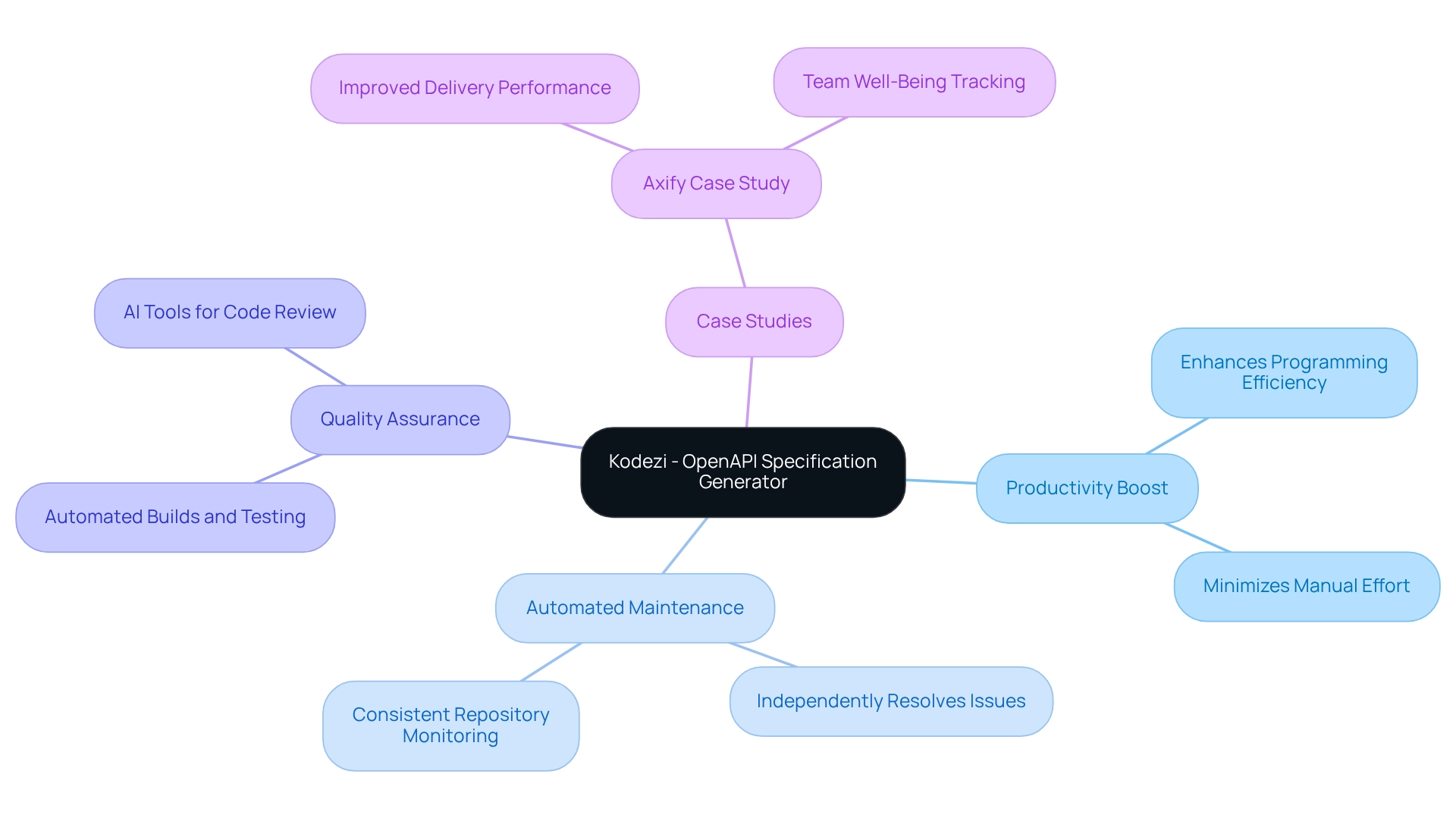
GitHub Copilot: Enhance Coding Efficiency with AI-Powered Suggestions
Developers often face significant challenges in coding, particularly when dealing with repetitive tasks and boilerplate scripts. The GitHub AI assistant functions as an AI-driven coding assistant, offering real-time suggestions that significantly enhance developer efficiency. By intelligently analyzing the context of the script being created, Copilot offers relevant snippets and functions, enabling developers to concentrate on problem-solving rather than getting bogged down by tedious coding tasks. This streamlined method not only speeds up the coding process but also enhances overall code quality by promoting adherence to best practices.
Are you a short-tenured or junior developer looking to enhance your skills? Recent studies indicate that these developers are particularly inclined to utilize resources like Copilot, often continuing their use beyond the initial month. This trend emphasizes the instrument's effectiveness in easing the learning curve for new developers. Furthermore, as the GitHub AI assistant evolves, its potential to enhance productivity is expected to grow. IT leaders are encouraged to strategically integrate these tools into their workflows to maintain a competitive edge.
Real-world examples demonstrate that AI-powered suggestions can significantly reduce cognitive load, allowing developers to focus on more complex tasks. This tool empowers developers by offering automated code debugging features that promptly detect and resolve codebase problems, enhance performance, and guarantee security compliance. Users have praised Kodezi for transforming their debugging experience, with testimonials highlighting how it feels like unlocking a new superpower in coding. As GitHub emphasizes, promoting trust and clear guidelines surrounding AI resources is crucial for achieving their full potential.
In addition, consider exploring the tools available on the platform to maximize your coding efficiency and improve your overall productivity.
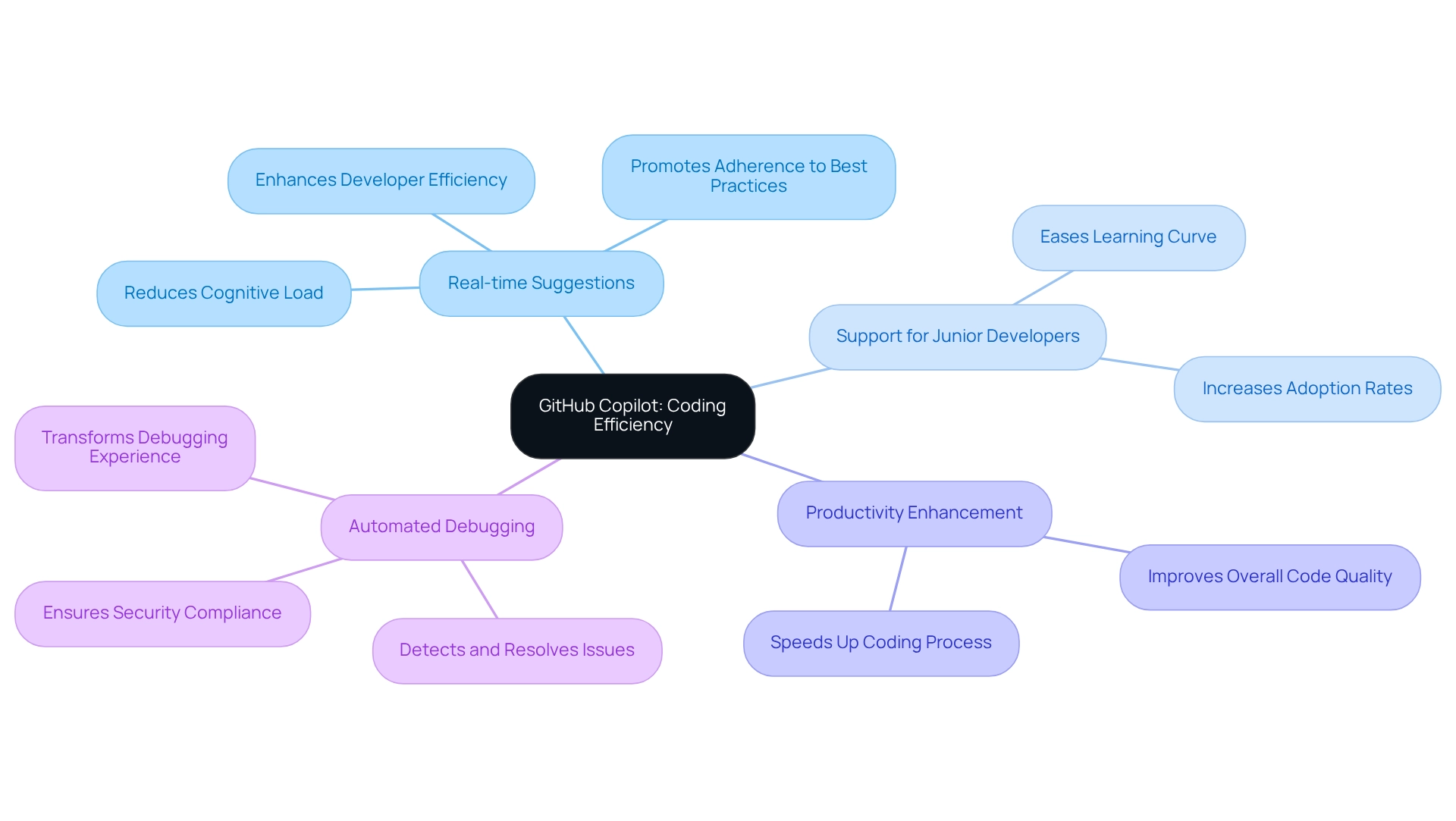
GitHub AI Tools: Foster Collaboration and Team Productivity
Developers often face significant coding challenges that can hinder collaboration and productivity. The GitHub AI Assistant's collection of AI resources effectively addresses these challenges by optimizing communication and integration among group members. Features such as pull request recommendations and automated reviews not only uphold high programming standards but also minimize friction in the development process. By automating repetitive tasks, these resources allow developers to concentrate on more complex challenges, ultimately boosting overall group productivity.
For example, teams utilizing automated code reviews have reported productivity enhancements of up to 30%, showcasing the tangible benefits of these innovations. Furthermore, expert insights reveal that efficient collaborative resources are essential for fostering a supportive group atmosphere, as they facilitate ongoing discussions and problem resolution. This collaborative spirit is evident in real-world scenarios where teams that utilize the GitHub AI Assistant have experienced heightened morale and cohesion, leading to more successful project outcomes.
Why not explore these tools on GitHub and see how they can enhance your team's coding experience?
AI Debugging Tools: Accelerate Bug Identification and Resolution
In today's fast-paced development environment, coding challenges can often hinder progress. How can developers effectively tackle these issues? Enter Kodezi, a platform that leverages AI debugging applications to utilize machine learning algorithms for detecting and fixing bugs more efficiently than traditional methods. By analyzing programming patterns and historical data, Kodezi anticipates potential problems and suggests solutions, allowing developers to resolve issues before they escalate.
This proactive approach not only saves valuable time but also significantly enhances the overall quality of software development. The automated debugging feature exemplifies this, enabling users to swiftly identify and rectify issues within the codebase while providing detailed explanations of the occurrences and resolutions. Furthermore, Kodezi CLI autonomously enhances codebases by addressing performance bottlenecks, ensuring security compliance, and implementing exception handling before bugs reach production. This positions it as an indispensable resource for B2B engineering teams.
Developers are increasingly confident in the integration of AI resources into their workflows, particularly in areas like documentation (81%), testing (80%), and code writing (76%). This growing confidence underscores the transformative benefits of AI debugging tools, which are revolutionizing bug detection and resolution. As machine learning technology advances, its impact on reducing bug resolution times becomes increasingly evident, making these resources vital in modern software development.
A case study on the incorporation of AI tools in development workflows showcases how these features not only improve bug resolution but also enhance developer efficiency. Quality in software development is crucial, as Hermann Tietz aptly states that quality is fundamentally about customer retention rather than product return. So, why not explore the tools available on Kodezi and elevate your coding practices today?
Automated Testing Solutions: Ensure Code Quality with AI Integration
Developers often face significant challenges in maintaining code quality and efficiency. Automated testing solutions driven by AI, such as the Kodezi CLI tool, address these issues effectively. This tool enhances code quality by providing quicker and more precise testing processes. It autonomously improves your codebase and resolves bugs before they reach production, ensuring that any issues are swiftly identified and addressed.
Kodezi not only generates test cases automatically but also executes them and analyzes results. This leads to higher test coverage and reduces the time spent on manual testing. By integrating AI into their workflows, development teams can streamline their processes and enhance overall efficiency. Have you considered how much time you could save by automating these tasks?
For a quick start, check out the '5 minute quickstart' guide and see a demo to experience the benefits firsthand. Statistics indicate that the use of AI in software development is projected to grow by 37.3% from 2023 to 2030, underscoring the increasing reliance on these technologies. Furthermore, expert opinions highlight that the automation capabilities of AI will extend beyond mere testing execution. In the long run, it will encompass script generation and test result analysis, further enhancing efficiency. Are you ready to leverage Kodezi for improved productivity and code quality?
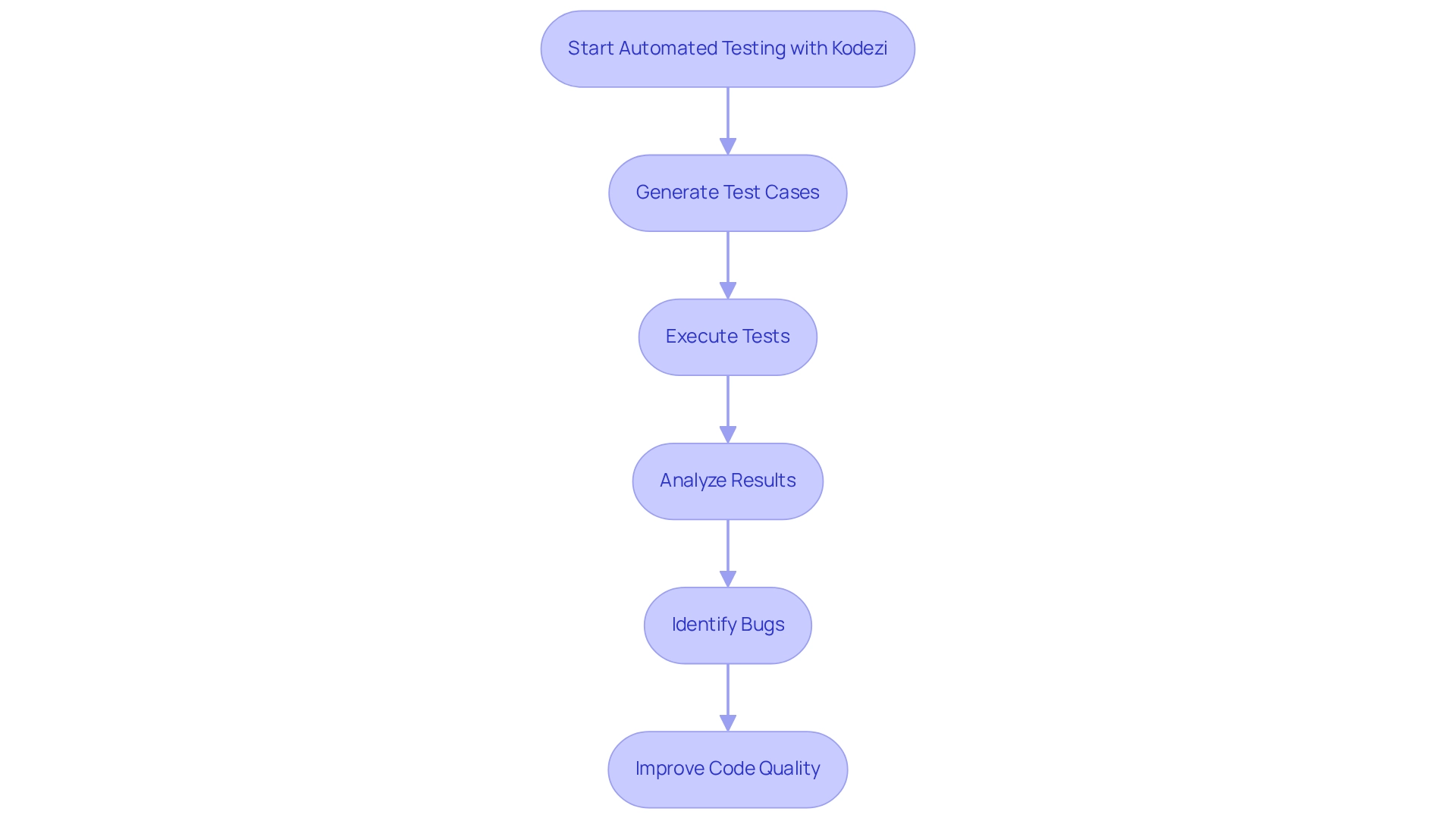
Real-Time Feedback Mechanisms: Improve Developer Experience with AI Insights
Coding challenges can be daunting for developers, often leading to frustration and inefficiency. Real-time feedback systems driven by AI, including the GitHub AI assistant, offer a solution by providing instant insights during program creation. These advanced tools identify potential issues, suggest improvements, and enforce coding standards, enabling developers to make necessary adjustments on the fly.
Kodezi illustrates this by focusing on submitting scripts that don't disrupt the codebase, promptly detecting and resolving problems before they enter production. This instant feedback loop not only enhances the developer experience but also results in higher quality software and a significant reduction in technical debt. Have you ever wondered how much easier coding could be with the right tools? Statistics indicate that organizations utilizing the GitHub AI assistant for real-time feedback can experience a remarkable enhancement in developer performance, with studies showing that such systems can decrease coding errors by as much as 30%.
Furthermore, Kodezi's distinctive role as an 'autocorrect for programming' sets it apart from other applications like Copilot. It enables users to automatically debug and resolve programming issues instead of merely autofilling syntax. As companies increasingly adopt AI, including the GitHub AI assistant, to remain competitive in the software development landscape, the importance of real-time feedback mechanisms becomes even more pronounced. This fosters an environment where developers can thrive and innovate.
In addition, Kodezi continuously monitors codebases and autonomously heals issues, ensuring that teams maintain cleaner codebases and improve overall productivity. Why not explore the tools available on the Kodezi platform and see how they can transform your coding experience?
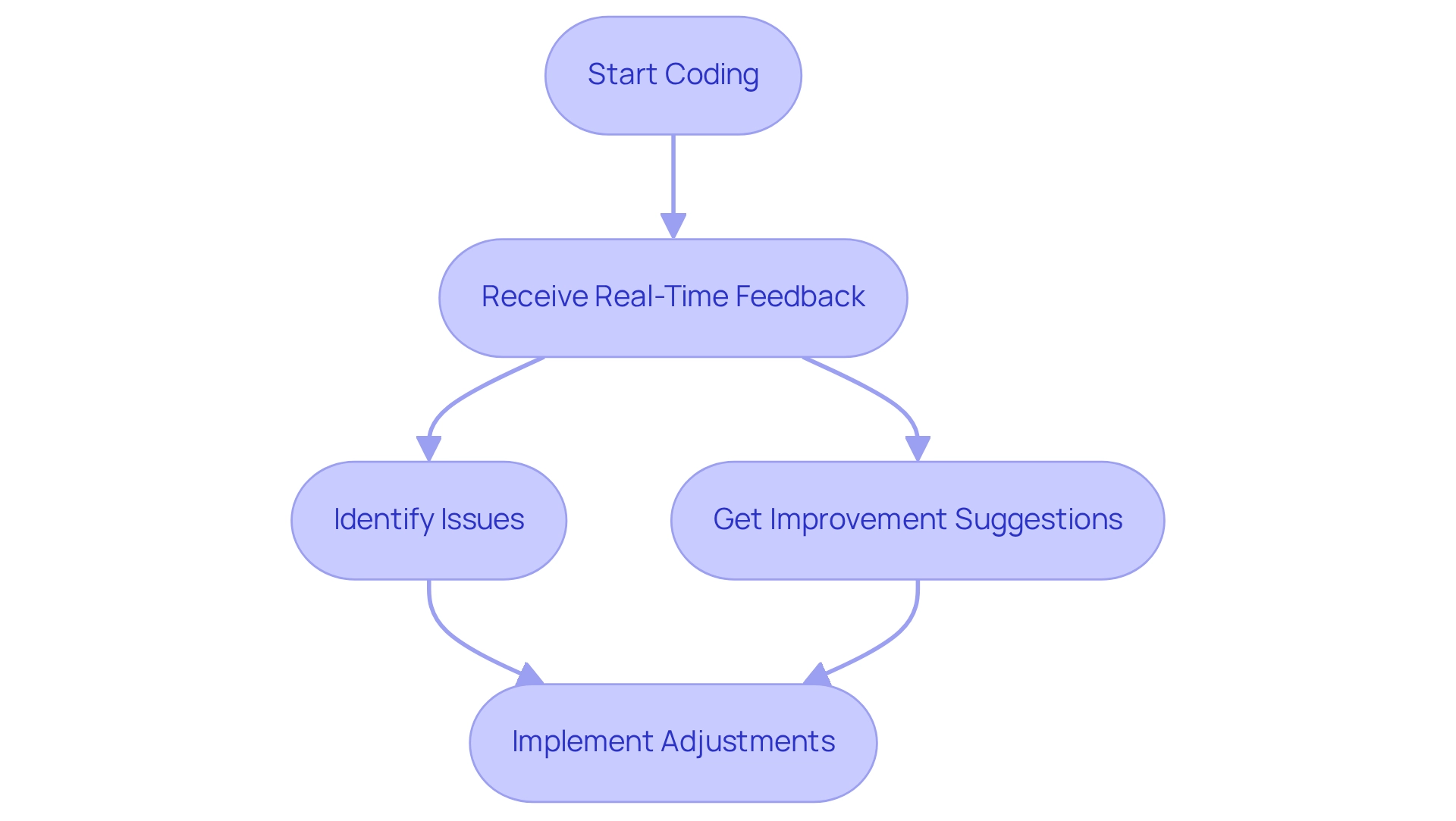
AI Documentation Tools: Keep Project Documentation Up-to-Date
In the fast-paced world of software development, maintaining accurate project documentation can be a daunting challenge. AI documentation resources, such as the GitHub AI assistant, simplify this upkeep by automatically assessing code modifications and producing the necessary updates. Imagine a tool that not only generates but also oversees README files, API documentation, and inline comments, ensuring that all stakeholders have access to precise and timely information.
By reducing the manual effort needed for documentation, teams can focus their attention on development, greatly enhancing productivity with the help of the GitHub AI assistant, which is increasingly being adopted for documentation. Projections indicate that by 2025, a significant portion of enterprises will leverage AI for automation tasks, including documentation updates. This shift not only enhances the accuracy of project documentation but also fosters a more agile development environment. Teams can respond swiftly to changes while maintaining high standards of quality.
Real-world examples show that automated documentation processes lead to improved team efficiency, allowing developers to concentrate on innovation rather than administrative overhead.
So, why not explore the tools available on platforms like Kodezi? With the GitHub AI assistant for AI-driven documentation, you can transform your coding practices and elevate your project management. Don't let documentation be a burden; embrace the future of development with automated solutions that empower your team.
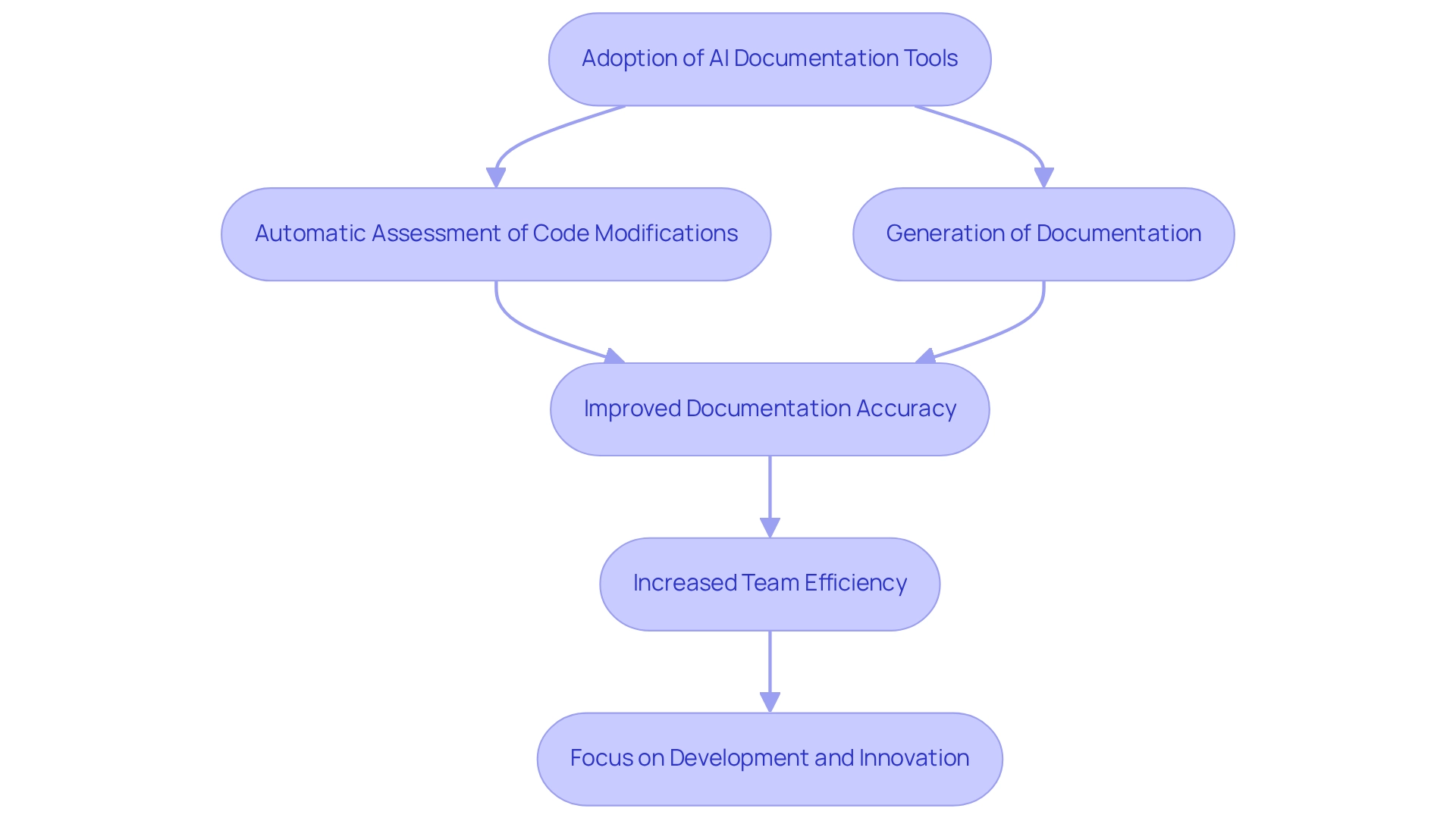
AI Security Tools: Identify Vulnerabilities and Enhance Code Security
AI security solutions are essential for identifying vulnerabilities within codebases, employing advanced algorithms to analyze patterns and detect anomalies. By automating security evaluations, these resources effectively pinpoint potential risks and recommend remediation strategies, significantly enhancing the overall security posture of development teams. In 2025, organizations utilizing AI security technologies report a notable decrease in security breaches, as automated assessments reveal vulnerabilities that manual reviews often overlook, resulting in a stronger defense against potential exploits.
Furthermore, expert insights emphasize that while AI has revolutionized threat detection, it necessitates human oversight to interpret complex contexts effectively. This dual approach optimizes the security process and ensures that teams remain vigilant against evolving threats. Businesses that have integrated AI tools into their workflows have observed substantial improvements in their ability to swiftly identify and address vulnerabilities, while also resolving performance bottlenecks and enhancing exception handling.
As AI continues to advance, its role in software development is set to expand, establishing it as an indispensable resource for teams striving to maintain secure and resilient codebases. The prevailing trend indicates an increasing reliance on AI innovations for programming security evaluations, underscoring a shift towards proactive rather than reactive safety strategies. By embracing these advancements, development teams can bolster their code security and diminish the likelihood of breaches, ultimately cultivating a safer software development environment.
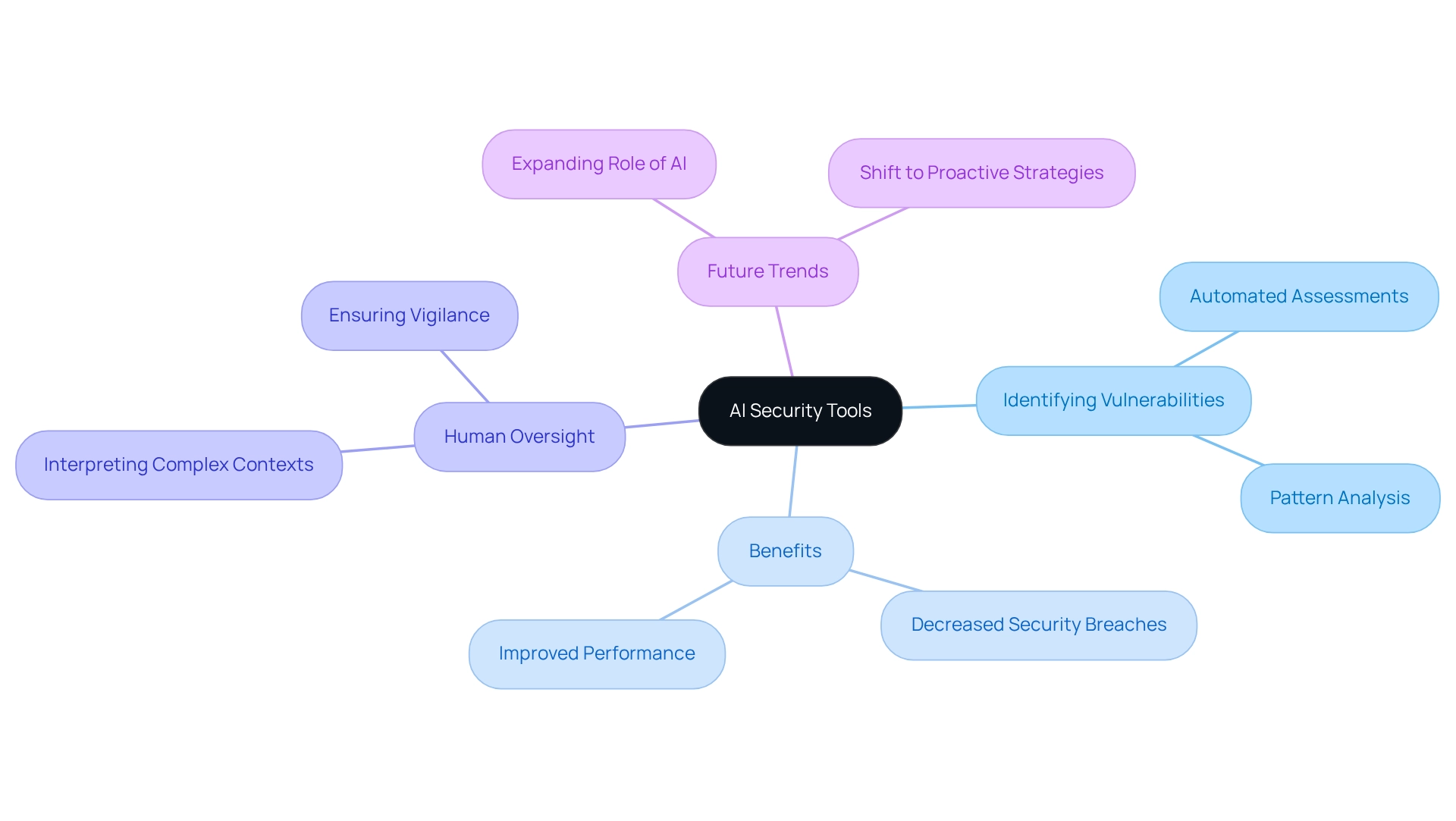
CI/CD Integration: Streamline Deployment with AI Tools
Integrating AI into CI/CD pipelines addresses the coding challenges developers frequently encounter, streamlining deployment processes through automation of testing, monitoring, and feedback loops. Tools like Kodezi CLI independently enhance codebases, resolving issues before they reach production and significantly boosting programming efficiency for B2B engineering teams. Furthermore, AI applications assess deployment metrics, anticipate potential problems, and optimize resource distribution, ensuring that software releases are both timely and reliable. This automation minimizes manual intervention, enhancing the overall efficiency of the development lifecycle, and current trends indicate a shift towards the integration of a GitHub AI assistant within CI/CD processes, which is expected to become standard practice by 2025.
Statistics reveal improvements in deployment efficiency, with organizations utilizing AI resources, such as the GitHub AI assistant and Kodezi CLI, reporting significant enhancements. Quality Costs analysis shows a marked decrease in defect metrics compared to historical data. Real-world examples illustrate how AI resources transform deployment processes. For instance, the CD Foundation promotes standards in Continuous Delivery, advocating for improved interoperability among resources, aligning with the growing trend of AI integration.
Expert opinions highlight the necessity of incorporating AI into CI/CD pipelines. Claude Shannon's vision of a future where machines enhance human capabilities resonates strongly in this context. As software complexity escalates, AI resources such as the GitHub AI Assistant become essential allies in the software development process. To experience these benefits firsthand, explore our 5-minute quickstart and watch a demo.
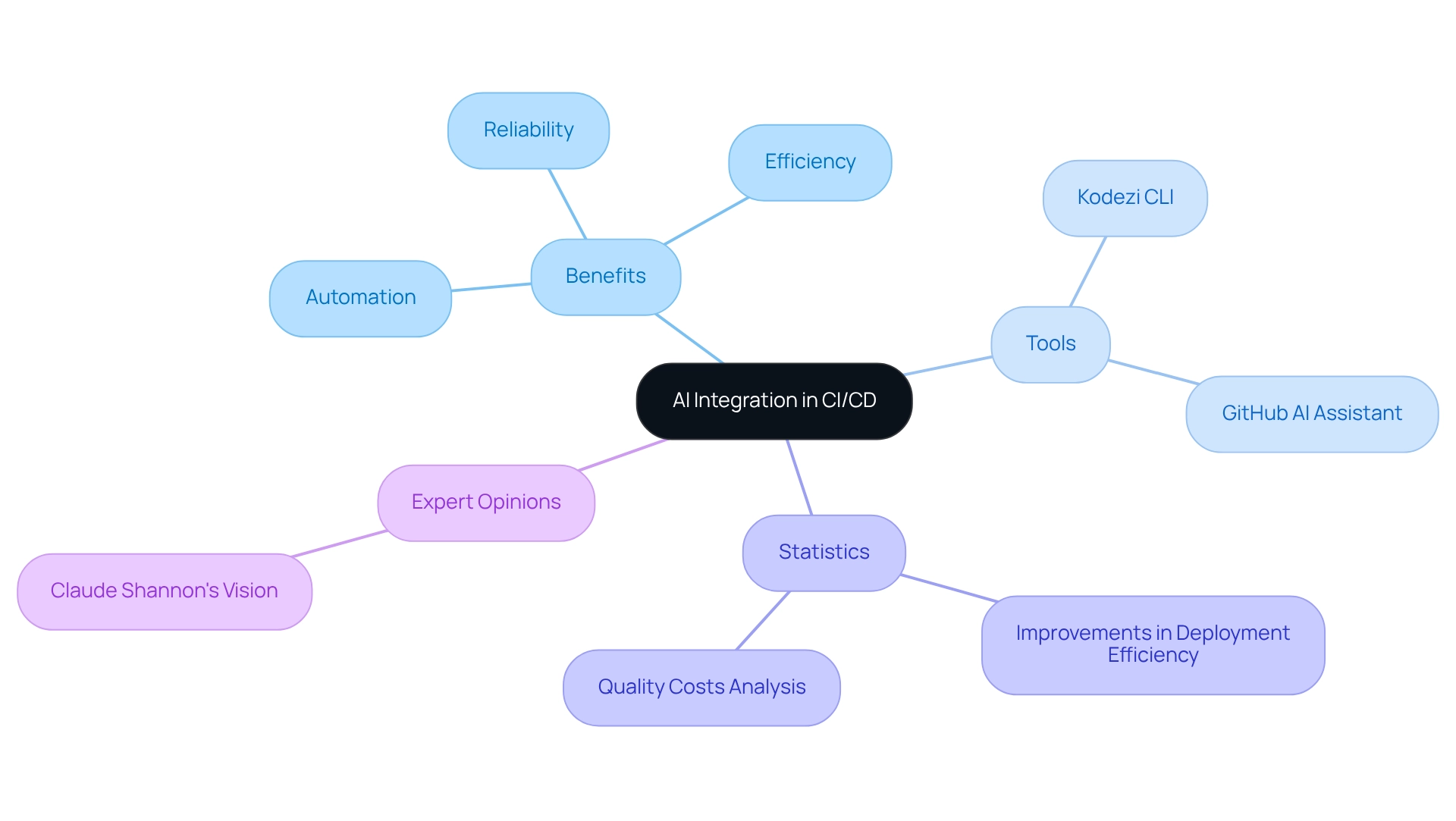
Future of Coding: Embrace AI for Continuous Improvement and Innovation
The future of coding is poised for a significant transformation, primarily driven by AI technologies such as the GitHub AI assistant, which facilitate continuous improvement and innovation. Developers often face challenges such as tedious bug fixing and documentation synchronization. How can these hurdles be overcome? Enter Kodezi OS, a tool that not only automates these mundane tasks but also fosters collaboration and enhances code quality. With its automated code debugging feature, users can swiftly identify and resolve issues within their codebase, receiving detailed explanations and insights into the problems encountered and the solutions implemented.
This capability optimizes performance while ensuring compliance with the latest security best practices, making it an invaluable asset for developers. Notably, 30% of business owners anticipate AI's role in generating website copy, reflecting a broader trend towards automation across various domains, including software development. Furthermore, generative AI applications have been associated with increased revenue and cost reductions, emphasizing the need for a holistic approach to AI solutions in coding practices. User testimonials reveal that over 1,000,000 programmers consider this tool a game-changer, with many asserting it has significantly boosted their debugging efficiency and overall productivity. As one user remarked, "This tool has helped me identify and resolve bugs more quickly and simply than attempting to do so manually." It truly is a lifesaver for correcting issues and bugs.
Looking ahead to 2025, the coding landscape will increasingly depend on AI to streamline processes and enhance outcomes. Current trends indicate that the GitHub AI assistant is emerging as the next frontier for innovation, enabling teams to gain a competitive edge in a rapidly evolving environment. Real-world examples showcase how Kodezi OS enables continuous enhancement, with numerous organizations reporting substantial improvements in coding practices through automation and intelligent insights, such as automatically correcting bugs and updating documentation without manual intervention.
As we consider the future, embracing these advancements, such as the GitHub AI assistant, will be crucial for engineering teams striving to excel in the dynamic software landscape. The integration of AI not only boosts efficiency but also ensures that codebases remain robust and adaptable, paving the way for sustained innovation. Teams should explore tools like Kodezi OS to fully leverage the potential of AI in their development processes.
Conclusion
The challenges that developers face in coding are significant. However, the integration of AI tools like Kodezi is revolutionizing software development by providing powerful resources that enhance productivity, code quality, and collaboration. Kodezi addresses these challenges by automating routine tasks such as code maintenance, debugging, and documentation, allowing teams to focus on innovation and complex problem-solving.
The benefits of using Kodezi are clear. Enhanced coding efficiency, reduced manual effort, and an improved security posture are just a few advantages that come with these tools. With the ability to identify vulnerabilities, automate testing, and streamline CI/CD processes, Kodezi not only boosts individual developer performance but also contributes to the overall success of development teams.
Looking ahead, the future of coding is poised for further transformation as AI continues to evolve and integrate into development workflows. By embracing these advancements, engineering teams can maintain a competitive edge in an ever-changing landscape. The call to action is clear: leveraging AI tools like Kodezi is essential for fostering a culture of continuous improvement and innovation, paving the way for a more efficient and secure software development environment.
Frequently Asked Questions
What is Kodezi and how does it benefit software development?
Kodezi is a professional OpenAPI specification generator that automates software maintenance and quality assurance. It enhances productivity by independently overseeing software repositories, identifying problems, and implementing solutions, allowing teams to focus on innovation rather than troubleshooting.
How does Kodezi improve code quality and maintenance?
Kodezi enhances code quality by automating builds and testing processes throughout the development lifecycle. It resolves issues before deployment, ensuring applications remain tidy and adhere to standards, thereby reducing manual effort in maintaining high-quality programming.
Can you provide an example of Kodezi's impact on a team?
The Axify case study demonstrates that Kodezi's capabilities led to substantial improvements in delivery performance and team well-being, highlighting the efficiency of automated maintenance solutions in streamlining workflows.
What role does GitHub Copilot play in coding efficiency?
GitHub Copilot is an AI-driven coding assistant that provides real-time suggestions, helping developers overcome challenges with repetitive tasks and boilerplate scripts. It enhances developer efficiency by allowing them to focus on problem-solving rather than tedious coding tasks.
How does GitHub Copilot assist junior developers?
Junior developers often benefit from GitHub Copilot as it eases their learning curve. Studies show that they tend to continue using the tool beyond the initial month, indicating its effectiveness in enhancing their coding skills.
What are the advantages of using GitHub AI tools for team collaboration?
GitHub AI tools optimize communication and integration among team members by automating repetitive tasks and providing features like pull request recommendations and automated reviews. This helps maintain high programming standards and boosts overall group productivity.
What productivity improvements have teams experienced with automated code reviews?
Teams utilizing automated code reviews have reported productivity enhancements of up to 30%, showcasing the tangible benefits of these innovations in fostering collaboration and improving project outcomes.
How do AI tools contribute to team morale and cohesion?
Efficient collaborative resources, such as those provided by the GitHub AI Assistant, facilitate ongoing discussions and problem resolution, leading to heightened morale and cohesion among team members, which contributes to more successful project outcomes.




